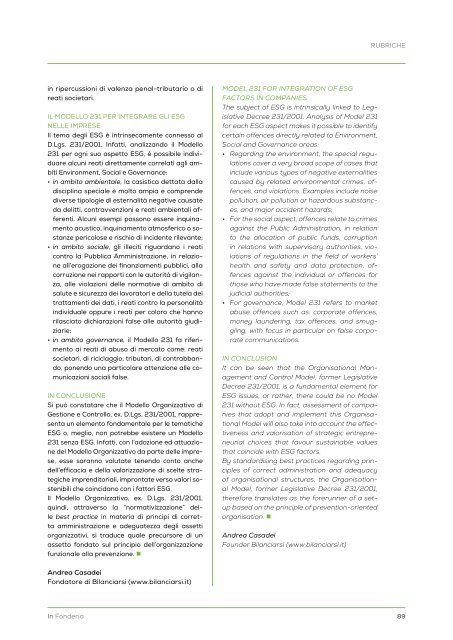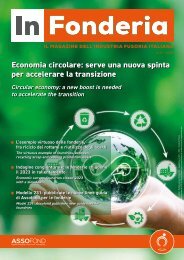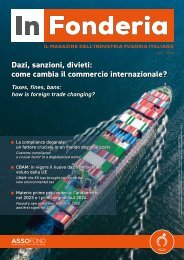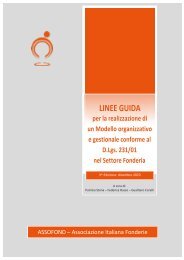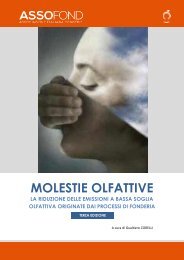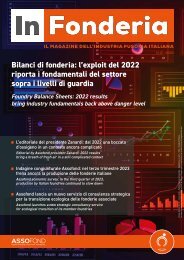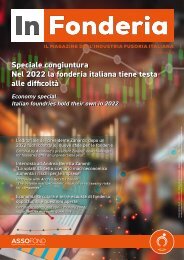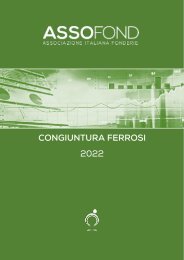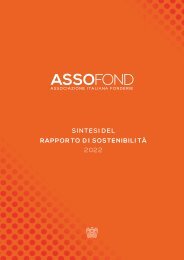In Fonderia 4 2023
Quarto numero del 2023 di In Fonderia
Quarto numero del 2023 di In Fonderia
You also want an ePaper? Increase the reach of your titles
YUMPU automatically turns print PDFs into web optimized ePapers that Google loves.
RUBRICHE<br />
in ripercussioni di valenza penal-tributario o di<br />
reati societari.<br />
IL MODELLO 231 PER INTEGRARE GLI ESG<br />
NELLE IMPRESE<br />
Il tema degli ESG è intrinsecamente connesso al<br />
D.Lgs. 231/2001. <strong>In</strong>fatti, analizzando il Modello<br />
231 per ogni suo aspetto ESG, è possibile individuare<br />
alcuni reati direttamente correlati agli ambiti<br />
Environment, Social e Governance:<br />
• in ambito ambientale, la casistica dettata dalla<br />
disciplina speciale è molto ampia e comprende<br />
diverse tipologie di esternalità negative causate<br />
da delitti, contravvenzioni e reati ambientali afferenti.<br />
Alcuni esempi possono essere inquinamento<br />
acustico, inquinamento atmosferico o sostanze<br />
pericolose e rischio di incidente rilevante;<br />
• in ambito sociale, gli illeciti riguardano i reati<br />
contro la Pubblica Amministrazione, in relazione<br />
all’erogazione dei finanziamenti pubblici, alla<br />
corruzione nei rapporti con le autorità di vigilanza,<br />
alle violazioni delle normative di ambito di<br />
salute e sicurezza dei lavoratori e della tutela dei<br />
trattamenti dei dati, i reati contro la personalità<br />
individuale oppure i reati per coloro che hanno<br />
rilasciato dichiarazioni false alle autorità giudiziarie;<br />
• in ambito governance, il Modello 231 fa riferimento<br />
ai reati di abuso di mercato come: reati<br />
societari, di riciclaggio, tributari, di contrabbando,<br />
ponendo una particolare attenzione alle comunicazioni<br />
sociali false.<br />
IN CONCLUSIONE<br />
Si può constatare che il Modello Organizzativo di<br />
Gestione e Controllo, ex. D.Lgs. 231/2001, rappresenta<br />
un elemento fondamentale per le tematiche<br />
ESG o, meglio, non potrebbe esistere un Modello<br />
231 senza ESG. <strong>In</strong>fatti, con l’adozione ed attuazione<br />
del Modello Organizzativo da parte delle imprese,<br />
esse saranno valutate tenendo conto anche<br />
dell’efficacia e della valorizzazione di scelte strategiche<br />
imprenditoriali, improntate verso valori sostenibili<br />
che coincidano con i fattori ESG.<br />
Il Modello Organizzativo, ex. D.Lgs. 231/2001,<br />
quindi, attraverso la “normativizzazione” delle<br />
best practice in materia di principi di corretta<br />
amministrazione e adeguatezza degli assetti<br />
organizzativi, si traduce quale precursore di un<br />
assetto fondato sul principio dell’organizzazione<br />
funzionale alla prevenzione. •<br />
MODEL 231 FOR INTEGRATION OF ESG<br />
FACTORS IN COMPANIES<br />
The subject of ESG is intrinsically linked to Legislative<br />
Decree 231/2001. Analysis of Model 231<br />
for each ESG aspect makes it possible to identify<br />
certain offences directly related to Environment,<br />
Social and Governance areas:<br />
• Regarding the environment, the special regulations<br />
cover a very broad scope of cases that<br />
include various types of negative externalities<br />
caused by related environmental crimes, offences,<br />
and violations. Examples include noise<br />
pollution, air pollution or hazardous substances,<br />
and major accident hazards;<br />
• For the social aspect, offences relate to crimes<br />
against the Public Administration, in relation<br />
to the allocation of public funds, corruption<br />
in relations with supervisory authorities, violations<br />
of regulations in the field of workers’<br />
health and safety and data protection, offences<br />
against the individual or offences for<br />
those who have made false statements to the<br />
judicial authorities;<br />
• For governance, Model 231 refers to market<br />
abuse offences such as: corporate offences,<br />
money laundering, tax offences, and smuggling,<br />
with focus in particular on false corporate<br />
communications.<br />
IN CONCLUSION<br />
It can be seen that the Organisational Management<br />
and Control Model, former Legislative<br />
Decree 231/2001, is a fundamental element for<br />
ESG issues, or rather, there could be no Model<br />
231 without ESG. <strong>In</strong> fact, assessment of companies<br />
that adopt and implement this Organisational<br />
Model will also take into account the effectiveness<br />
and valorisation of strategic entrepreneurial<br />
choices that favour sustainable values<br />
that coincide with ESG factors.<br />
By standardising best practices regarding principles<br />
of correct administration and adequacy<br />
of organisational structures, the Organisational<br />
Model, former Legislative Decree 231/2001,<br />
therefore translates as the forerunner of a setup<br />
based on the principle of prevention-oriented<br />
organisation. •<br />
Andrea Casadei<br />
Founder Bilanciarsi (www.bilanciarsi.it)<br />
Andrea Casadei<br />
Fondatore di Bilanciarsi (www.bilanciarsi.it)<br />
<strong>In</strong> <strong>Fonderia</strong><br />
89


